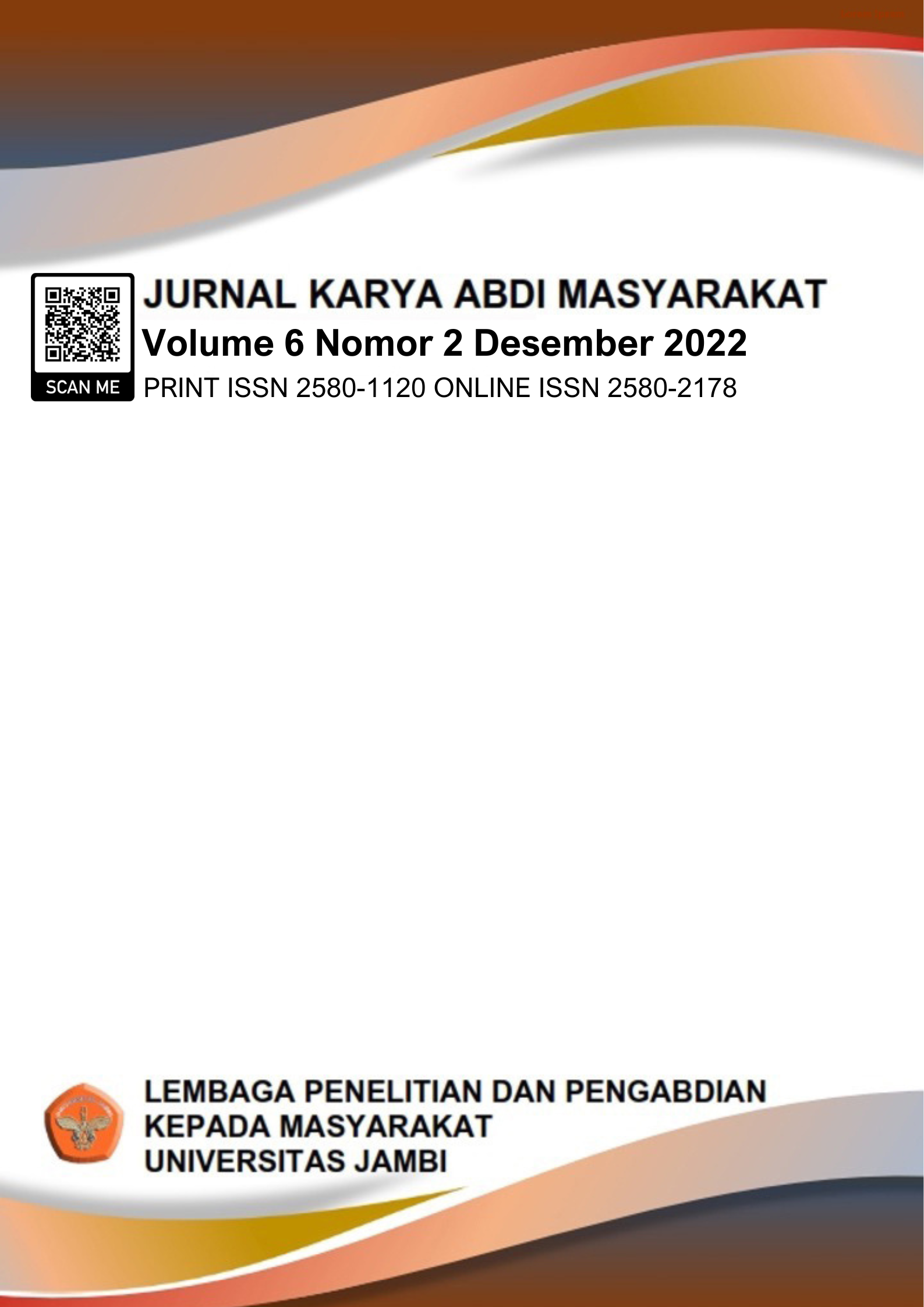Pelatihan Manajemen Badan Usaha Milik Kalurahan (BUMKAL) Catur Sejahtera Berbasis Technopreneurship Menuju Ekonomi Kreatif
DOI:
https://doi.org/10.22437/jkam.v6i2.20783Abstract
Desa Caturharjo, Kecamatan Pandak, Kabupaten Bantul, Provinsi DI Yogyakarta merupakan salah satu penyumbang sampah di TPST Piyungan. TPST tersebut kerap dilakukan penutupan dikarenakan volume sampah yang terus meningkat. Untuk mengatasi permasalahan tersebut pemerintah Kota Bantul membentuk Badan Usaha Milik Kalurahan (BUMKAL) yang bergerak dibidang usaha sampah. Salah satu BUMKAL yang sudah terbentuk yaitu BUMKAL Catur Sejahtera yang beranggotakan masyarakat Desa Caturharjo. Usia BUMKAL masih terbilang muda yaitu satu bulan. BUMKAL Caturharjo kedepannya akan mengembangkan berbagai usaha sampah untuk menunjang program Bantul Bersama (Bersih Sampah 2025). Bumkal Caturharjo berupaya mengelola sampah yang ada di Desa Caturharjo untuk menekan volume sampah dan menjadikannya usaha kreatif. BUMKAL terdiri dari 11 Pengurus dimana Lurah sebagai penasihat dan Ade Encup sebagai direktur. Pengembangan usaha berbahan dasar sampah dilatarbelakangi oleh kondisi di Desa Caturharjo dimana terdapat beberapa tempat wisata, ternak lele, kuliner tradisional (terdapat 14 warung bakmi) dan penduduk desa mayoritas bertani. Berangkat dari kondisi tersebut maka sebisa mungkin Desa Caturharjo dapat mencukupi pasokan kerajinan untuk tempat wisata, ulat magot untuk ternak lele, briket untuk memasak kuliner tradisional, dan pupuk untuk pertanian. Persoalan yang dihadapi Bumkal Caturharjo diantaranya: belum memiliki peta jalan dalam pengelolaan sampah berbasis technopreneurship, (2) kesadaran masyarakat untuk memanfaatkan sampah masih rendah, (3) belum memiliki akses infromasi terkait pengelolaan sampah, (3) belum adanya produk yang dihasilkan dari bahan baku sampah, dan (4) belum dapat memasarkan produk daur ulang sampah, (5) belum adanya marketplace untuk penjualan produk, (5) belum adanya wadah untuk memfasilitasi masyarakat untuk meningkatkan keterampilan dalaam mengolah sampah menjadi aneka kerajinan, pupuk briket dan budidaya maggot, (6) belum adanya pengelolaan sampah berbasis digital. Tujuan dari kegiatan meningkatkan peran BUMKAL sebagai pionir menuju ekonomi kreatif dan pusat studi pengelolaan sampah berbasis technopreneurship. Solusi permasalahan diantaranya: (1) penyuluhan wirausahan sampah berbasis digital, (2) pembuatan aplikasi (sistem informasi dan penerpan website pemasaran produk daur ulang yang terintegrasi ), (3) pelatihan pembuatan pupuk, (4) pelatihan budidaya ulat maggot untuk pakan ternak, (5) pelatihan aneka kerajinan daur ulang sampah, (6) pelatihan pembuatan briket dari sampah organik, (7) pelatihan penggunaaan aplikasi keuangan, (8) pelatihan pemasaran, (9) legalitas produk, (10) pagelaran produk, (11) terciptanya balai edukasi pengolahan sampah, (12) lokakarya hasil, dan (13) keberlanjutan program.
Downloads
Downloads
Published
How to Cite
Issue
Section
License
Copyright (c) 2022 Deny Ismanto, Ahmad Ahid Mudayana, Purwati Zisca Diana, Vera Yuli Erviana, Iis Suwartini

This work is licensed under a Creative Commons Attribution-NonCommercial-ShareAlike 4.0 International License.
Please find the rights and licenses in Jurnal Jurnal Karya Abdi Masyarakat (JKAM).
- License
The non-commercial use of the article will be governed by the Creative Commons Attribution license as currently displayed on Creative Commons Attribution 4.0 International License.
- Authors Warranties
The author warrants that the article is original, written by stated author(s), has not been published before, contains no unlawful statements, does not infringe the rights of others, is subject to copyright that is vested exclusively in the author and free of any third party rights, and that any necessary written permissions to quote from other sources have been obtained by the author(s).
- User Rights
JKAM's spirit is to disseminate articles published are as free as possible. Under the Creative Commons license, JKAM permits users to copy, distribute, display, and perform the work for non-commercial purposes only. Users will also need to attribute authors and JKAM on distributing works in the journal.
- Rights of Authors
Authors retain the following rights:
- Copyright, and other proprietary rights relating to the article, such as patent rights,
- The right to use the substance of the article in future own works, including lectures and books,
- The right to reproduce the article for own purposes, provided the copies are not offered for sale,
- The right to self-archive the article.
- Co-Authorship
If the article was jointly prepared by other authors, the signatory of this form warrants that he/she has been authorized by all co-authors to sign this agreement on their behalf, and agrees to inform his/her co-authors of the terms of this agreement.
- Termination
This agreement can be terminated by the author or JKAM upon two months notice where the other party has materially breached this agreement and failed to remedy such breach within a month of being given the terminating party notice requesting such breach to be remedied. No breach or violation of this agreement will cause this agreement or any license granted in it to terminate automatically or affect the definition of JKAM.
- Royalties
This agreement entitles the author to no royalties or other fees. To such extent as legally permissible, the author waives his or her right to collect royalties relative to the article in respect of any use of the article by JKAM or its sublicensee.
- Miscellaneous
JKAM will publish the article (or have it published) in the journal if the articles editorial process is successfully completed and JKAM or its sublicensee has become obligated to have the article published. JKAM may conform the article to a style of punctuation, spelling, capitalization, referencing and usage that it deems appropriate. The author acknowledges that the article may be published so that it will be publicly accessible and such access will be free of charge for the readers.






